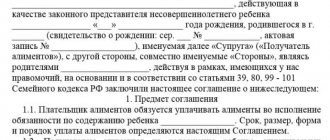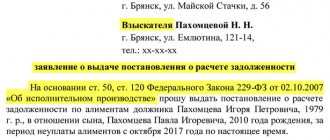Author of the article: Anastasia Ivanova Last modified: January 2021 14451
The obligation to pay alimony is a common form of financial support for children, parents or spouses, enshrined in law. These payments are withheld from all types of earnings. After registration and receipt of the willed property, the heirs should know whether alimony is paid from the inheritance. Let's look at this issue in more detail.
What happens to the alimony debt after the death of the debtor?
Alimony obligations terminate after the death of the payer on the basis of Art. 120 IC RF. Often, during their lifetime, people do not pay alimony, and debts accumulate. Then they have to be paid to the heirs.
Legislation protects the rights of minors in the first place, therefore alimony debt is collected by their representatives through the court. This is possible if payments were made according to one of three documents:
- Writ of execution (IL). Issued after the court decision has entered into legal force.
- Court order. Drawed up by the judge within 5 days when the claimant submits an application for an order.
- Settlement agreement. It is concluded by the payer and the recipient with a notary.
When paying money for a child without a writ of execution (ID) by verbal agreement, it will not be possible to collect the debt from the heirs - it simply does not exist. From a legal point of view, it can only be accumulated if there is an ID.
What points are important to consider:
- According to Art. 1112 of the Civil Code of the Russian Federation, alimony debts of testators are included in the inheritance mass. If, on the contrary, alimony was paid to the testator, the legal successors do not have the right to receive them later.
- Based on Art. 1175 of the Civil Code of the Russian Federation, alimony debt is transferred to the heirs within the limits of the price of the inherited property. If there are several of them, and there is only one property (for example, an apartment), the debt is distributed in proportion to their shares.
In inheritance by transmission, when the successor dies after the opening of the inheritance case before accepting the property, the latter is transferred to his heirs by law. They will not be responsible for the debts of a citizen who did not have time to accept the inheritance, but they will have to pay the debt of the original testator.
A minor child has the right to an obligatory share in the inheritance, even if the will is executed in the name of another person (Article 1149 of the Civil Code of the Russian Federation). He is allocated at least half of the share that he could receive by entering into an inheritance by law.
If there is an inheritance
As mentioned earlier, if there is an inheritance, the legal successors are liable for the debt obligations of the testator on the basis of Art. 1175 of the Civil Code of the Russian Federation.
Example from practice. The man had to pay alimony for the maintenance of his daughter from his first marriage - 12,000 rubles. monthly. He incurred a debt in the amount of 200,000 rubles. In January 2021, he dies, his second wife and child take over the inheritance, because... the girl is entitled to a mandatory share - 1/4 in the ownership. An apartment worth RUB 2,500,000 is inherited.
The ex-spouse (recipient) files a lawsuit to collect alimony debt. As a result of the consideration of the case, a court decision is made to satisfy the claims. The defendant is ordered to pay 200,000 rubles and is given an installment plan.
If there is no inheritance
In the absence of an inheritance, the relatives of the deceased are not liable for the debt obligations of the alimony obligee.
It will not be possible to collect the debt from them.
If the heir is the recipient of alimony
If the recipient of alimony himself enters into an inheritance, the debt will still have to be repaid within the value of the share.
Even if the testator inherited property to the child, the debt remains if there are other heirs.
The procedure for collecting alimony from an inheritance
There are two types of collection of alimony from an inheritance: by order and by claim .
The collection of alimony by order is preferable if there is no dispute about the legality and legality of the requirements. But if the defendant does not want to acknowledge the demands or if the claimant makes a request in the application to establish or challenge paternity (maternity) or requests the involvement of third parties in the case, or asks to assign alimony in a fixed amount, then the application must be filed in a claim procedure, which involves that a court hearing will be held and the parties to the case will be summoned.
The main advantage of a court order is the speed of its issuance. All you need is a statement from the claimant. Then, within five days after the judge receives the application, he alone, without a trial, can issue an order. Plus, the order itself will be a document of execution, which means that there is no need to obtain a writ of execution.
But there are also disadvantages to this method of collection. First of all, if the defendant sends his objection within ten days from the date of receipt of the document, then in this case the order is subject to cancellation.
This means that now the claimant needs to file a claim.
Information
Another advantage of filing a claim is that this method makes it possible to recover, in addition to alimony, funds for other expenses or for one’s own maintenance (for example, if the wife was pregnant or caring for a child under 3 years old).
How is child support debt calculated?
The calculation of alimony debt is carried out by a bailiff in accordance with Art. 113 RF IC:
- The period of non-payment is determined.
- The amount of earnings in case of recovery by share method for the above period is established, and the amount of payments is calculated.
- The amounts are added up taking into account the number of months.
Let's look at a practical example. The alimony payer did not pay in August, September and October 2021. In November, the debtor died, and the claimant turned to the bailiff for a ruling on calculating the alimony debt in a shared amount for one child.
It was not possible to establish the income of the alimony obligee for the specified period, so the debt was calculated based on the average salary in the Russian Federation - 30,000 rubles.
30,000 x 25% = 7,500 rub.
7500 x 3 = 22,500 rub. – total amount of debt.
The collector can find out the exact amount of the debt by submitting an application for a decree on debt settlement to the bailiff.
How to dispute alimony debt
Find out the alimony debt by last name (step-by-step instructions)
How to collect debt after the death of the debtor
In the event of the death of the payer, the recipient must notify the bailiff about this, otherwise the debt for enforcement proceedings will continue to accumulate. A death certificate is provided, on the basis of which the bailiff terminates enforcement proceedings (Article 43 of the Federal Law of October 2, 2007 No. 229-FZ).
What the recipient needs to do step by step:
- Order a certificate from the bailiff with the calculation of the debt. If alimony was paid by agreement, you will have to make the calculations yourself and justify them in court.
- File a claim with the court and attach evidence indicating the existence of a debt. During the review, an examination may be appointed to determine the value of the inherited property.
- Receive a court decision and a new IL, where the heir will be considered the payer.
- Present the IL to the bailiff for forced deduction of payments.
Contents and sample of the statement of claim
The requirements for claims in civil cases are contained in Art. 131 Code of Civil Procedure of the Russian Federation.
The application must contain the following information:
- name of the judicial authority;
- Full name of the deceased debtor;
- registration address, full name plaintiff;
- place of residence of the defendant, full name (heir);
- number of the decision and IL on the basis of which alimony was collected;
- date of death, death certificate number of the payer;
- inventory of inherited property;
- demand for collection of alimony debt;
- date and signature.
The application is drawn up in two copies. One is sent to the court, the second is given to the plaintiff with a registration mark.
Sample claim
Where to contact
The statement of claim must be filed in the district court at the defendant’s place of residence. If there are several of them, go to the address of one of them.
Documentation
Along with the claim, the following is submitted to the court:
- plaintiff's passport;
- an extract from the court decision and IL on the collection of alimony or an alimony agreement;
- certificate of debt settlement from the bailiff;
- statement of the creditor's bank account indicating the lack of receipt of funds.
State duty
The claim for collection of arrears of alimony from heirs is of a property nature, and the fee is calculated in accordance with Art. 333.19 of the Tax Code of the Russian Federation, depending on the amount of debt.
Obligations of heirs
Although the judiciary always sides with minors, the outcome of such proceedings is not always easy to predict. The judge has the right to reject the claim, referring to Article 120 of the Family Code, which talks about the termination of legal relations regarding alimony upon the death of one of the parties. This article makes it clear that third parties do not have any obligations in relation to the child. But in most cases, the judge makes a decision in favor of the claimant.
Heirs can pay off the debt using their personal or inherited:
- Money;
- real estate;
- shares and securities;
- intellectual property;
- own things;
- intangible values.
Arbitrage practice
For a long time, the courts held different opinions regarding the collection of alimony debt from heirs.
Some, guided by Art. 120 of the RF IC, refused to satisfy the claims, explaining the termination of any alimony obligations (including for debts) by the death of the debtors. The final point on the issue was put by the Supreme Court of the Russian Federation with its Determination No. 45-KG16-1 dated 03/01/2016. According to the document, the heirs wanted to challenge the initial decision, a ruling was made that satisfied them, but the Supreme Court of the Russian Federation sided with the claimant and explained that alimony debts are inherited. The appeal ruling was overturned, the decision of the first court was left unchanged.
Here are some practical examples:
- The deceased still owes alimony. The plaintiff wanted to recover 777,567.50 rubles from the heiress, but the court satisfied only 388,783.87 rubles. (Decision No. 2-2733/2019 2-70/2020 dated February 26, 2021 in case No. 2-2733/2019).
- The woman collected from the heirs the alimony debt, compensation for the costs of assessing the property and payment of state duty, and also demanded that the ownership of the car be terminated. By decision No. 2-519/2020 2-519/2020~M-100/2020 M-100/2020 dated February 20, 2021 in case No. 2-519/2020, the requirements were satisfied.
- The plaintiff demanded that property worth 637,285.95 rubles, received by the defendant as an inheritance, be transferred to her. By decision No. 2-250/2020 2-250/2020(2-2979/2019;)~M-2981/2019 2-2979/2019 M-2981/2019 dated January 9, 2021 in case No. 2-250/2020 the requirements were partially satisfied, RUR 318,643 was recovered.
Lawyer's answers to private questions
Is it possible to draw up an agreement with the heirs on the allocation of a share in the apartment in exchange for waiving the alimony debt?
Yes, the agreement must be notarized.
Does the father have to pay off the debt after the child's death?
Alimony obligations terminate due to the death of a minor, but the debt accumulates during his lifetime and will have to be paid.
If the child's father dies, who will pay the child support debt for him?
Based on Art. 120 of the RF IC, payment of alimony is terminated. But if the payer has incurred a debt, it will be paid by the direct heirs by law or by will. If there are no such people or they write a refusal of the inherited property, the debtor’s property will pass to the state, or rather to the municipality (such property is considered escheated). In this case, you need to prepare a claim for collection of alimony debt, naming the municipal administration as the defendant.
Are heirs required to pay alimony after the death of the debtor?
No. The inheritance does not include obligations that are inextricably linked with the personality of the testator (Article 1112 of the Civil Code of the Russian Federation).
What happens to the alimony debt after the death of the recipient?
The recipient acts in the interests of the child, and after his death the debt will not go anywhere. It can be collected by the guardian or the child himself after 18 years of age. If the recipient acts on his own behalf, after death no one will be able to demand alimony debt from the payer.
So to pay or not to pay?
All of the above allows us to conclude that property inheritance is not subject to alimony deductions. This applies to both monetary and any other inheritance. Only a verdict adopted during the trial can seize the inheritance. But even then, this can only be done by finding out that the alimony provider is a malicious evader and has accumulated arrears in payments.
The heir may voluntarily decide to pay a certain amount to the recipient or transfer the property to him. Any transactions of this kind must comply with the letter of the law and be properly certified.










